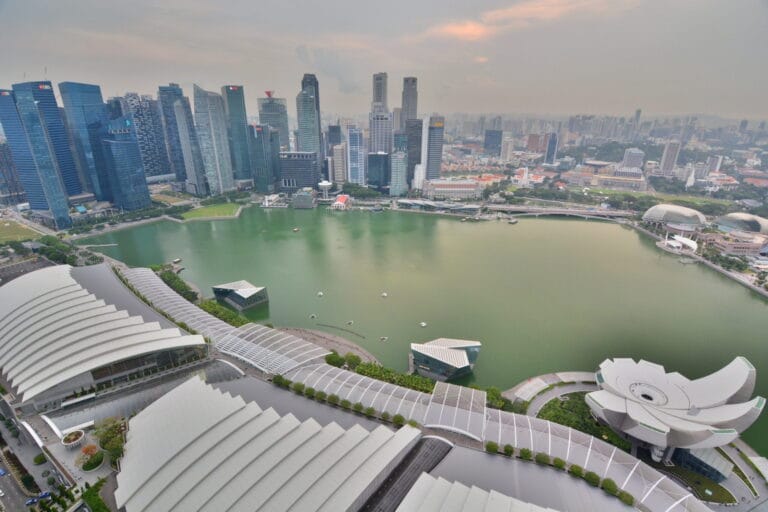From Tax Breaks to Bullion Booms
Singapore’s Unstoppable Rise in Precious Metals
Published on 9th June, 2025

Over the past decade, Singapore has become a global leader in precious metals investment, growing from a niche player to a major bullion center. Investors see Singapore as a safe place to store wealth because of its political stability, business-friendly policies, and modern infrastructure.
The data is clear – in the first quarter of 2025, Singapore’s bullion sales reached a record 2.5 tonnes of gold bars and coins sold, a 35% increase compared to the previous year, and the highest quarterly demand since 2010.
This article looks at why Singapore’s bullion market is booming, the roles of government and private sectors, and recent developments. It compares Singapore’s strengths with other centers like Switzerland, the UAE, and Hong Kong. It also covers key trends and regulations and offers forecasts for the next three years. Finally, it explains how Singapore became Asia’s “Switzerland of the East” for gold investors.
What’s Driving Singapore’s Bullion Boom:
Singapore’s rise to prominence in precious metals is driven by several key factors:
Government Vision and Industry Collaboration
A key reason for Singapore’s success is the clear goal set by its leaders to become a global hub for bullion trading. Even before the recent growth, they worked closely with industry groups including bullion banks, refiners, and the Singapore Bullion Market Association (SBMA) to plan how to attract precious metals. The 2012 GST exemption was a major part of this plan, making Singapore’s rules similar to top financial centers and boosting growth. Big events like the 2016 London Bullion Market Association conference also help promote Singapore’s bullion market. Together, public and private efforts have made Singapore a leading bullion hub in Asia.
Investor-Friendly Tax Environment
Singapore has a very attractive tax system for bullion investors since it charges no capital gains tax, and in 2012, it also removed the Goods and Services Tax (GST) on investment-grade precious metals. This means that physical gold, silver, and platinum of certain purity can be traded totally tax-free.
Political Stability, Rule of Law, Regulatory Framework and Reputation
Singapore’s strong laws, low corruption, and stable government give investors confidence to keep their wealth long-term. The government does not interfere with private bullion holdings, while clear property rights and strict contract rules make it a safe place for asset storage.
In 2019, Singapore passed a law that requires gold and gem dealers to follow anti-money-laundering rules. Dealers must register, check their customers, and report large cash transactions. These rules are updated regularly to meet global standards. Although precious metals are seen as higher-risk for money laundering, like real estate and crypto, Singapore’s strong oversight lowers these risks and reassures honest investors.
Strategic Location and Infrastructure
Sitting at the crossroads of the East and West, Singapore is an ideal location for Asia’s growing investors. The country’s modern ports make it easy to import and export bullion and its efficient customs system allows tax-free import of investment-grade metals. It has used this advantage to build advanced systems for storing and moving precious metals and local vaults are growing to keep up with demand.
High-security vaults like the Freeport, and other private facilities, are able to hold thousands of tonnes of gold and silver. Singapore’s facilities are well trusted by global leaders such as Deutsche Bank, who opened a 200 tonnes gold bullion vault in the Freeport in the early 2010s.
Synergy with Financial Hub Status
Singapore is a top global financial center offering strong expertise and services that support the investment of precious metals. Many international banks and bullion dealers have regional offices here. Investors can easily find services like secure storage, insurance, gold trading platforms, and bullion banking. Singapore’s advanced wealth management lets wealthy individuals include precious metals with other investments. This strong support system has helped attract both large institutions and individual investors to Singapore’s bullion market.

These factors combine to make Singapore a strong choice for precious metals investment. As The Safe House, a local vault operator, says, Singapore’s location, solid regulations, and tax benefits give investors Swiss-level security and trust — but with no sales tax on bullion and closer access to Asia’s growing wealth.
Policy Moves: How Singapore Set the Stage for Success
Singapore’s government has played a pivotal role in nurturing the precious metals sector. Key policy and regulatory strategies include:
Tax Exemption on Investment Precious Metals
Singapore’s 2012 decision to remove the 7% GST on investment-grade precious metals, put it on equal footing with tax-free hubs like Hong Kong and Switzerland. Removing this tax made Singapore much more attractive for trading and storing bullion, saving buyers a lot on large purchases. The goal was to grow Singapore’s share of the global gold trade, the results have been striking. Singapore’s physical gold trade has grown five times larger as a result, and jobs in the bullion industry have doubled.
Building a Regulatory Framework
Beyond tax breaks, Singapore built trust with strong oversight. The Precious Stones and Precious Metals Dealers (PSMD) Act of 2019 requires dealers to register and follow rules. This made the industry more professional and removed illegal operators. It also brought Singapore in line with global FATF standards. Regular updates to these rules show Singapore’s ongoing commitment to careful monitoring. This gives investors both tax benefits and confidence in strict enforcement and a good reputation.
Encouraging Industry Players and Infrastructure
Singapore works hard to attract global leaders in the precious metals industry. The government uses agencies like Enterprise Singapore to encourage refiners, vault operators, and traders to set up there, and these policies are clearly effective. Switzerland’s Metalor, a Swiss-based global leader in the precious metals industry founded in 1852, built a gold refinery in Singapore in 2013 after the GST was removed, with help from the government.
Enterprise Singapore also supports refiners seeking London Bullion Market Association (LBMA) “Good Delivery” status to boost their global reputation. Major logistics and vaulting firms like Brinks, Malca-Amit, and Loomis International have set up in Singapore too.
The Safe House is building a new facility called “The Reserve,” which can store about 15,000 tonnes of silver and 500 tonnes of gold — one of the largest silver storage sites in the world.
Global banks like JPMorgan and UBS offer bullion services here, and local banks provide bullion trading and secured loans. This strong cluster didn’t happen by chance; it is the result of a business-friendly environment and active outreach.
Marketing and Trade Agreements
Singapore has not been shy to market its advantages. Government and industry bodies like SBMA regularly attend international bullion conferences to pitch Singapore as the region’s secure vault. Singapore’s free-trade agreements and open economy make it easy for precious metals to move with little delay. EU trade data shows that Singapore imported over €1 billion worth of precious metals from the European Union in 2022, up from €760 million in 2021. This rise likely reflects more gold flowing into Singapore during a time of global uncertainty. Although imports have slowed since then — with about €490 million in 2024 — the overall level is still higher than before 2010. This growth is partly due to Singapore’s strong ties to global trade networks.

Conclusion
Singapore’s deliberate and multi-faceted approach to supporting and attracting the precious metals industry has been a resounding success. The country today is a clear global leader in this space. But far from resting on its laurels, Singapore continues to invest in its commitment to fostering the global bullion ecosystem. One of the strategies Singapore relies on, is arranging events like the Asia Pacific Precious Metals Conference (APPMC). The recent APPMC 2024 drew record attendance, highlighting Singapore’s growing influence as a critical meeting point for the entire APAC precious metals community.
The upcoming APPMC 2025 will be June 15-17 at the Shangri-La Hotel in Singapore is expected to further enhance the Lion City’s position as a global thought leader and a central conduit for connecting Asia’s wealth with the world’s precious metals markets. We look forward to meeting you there!













